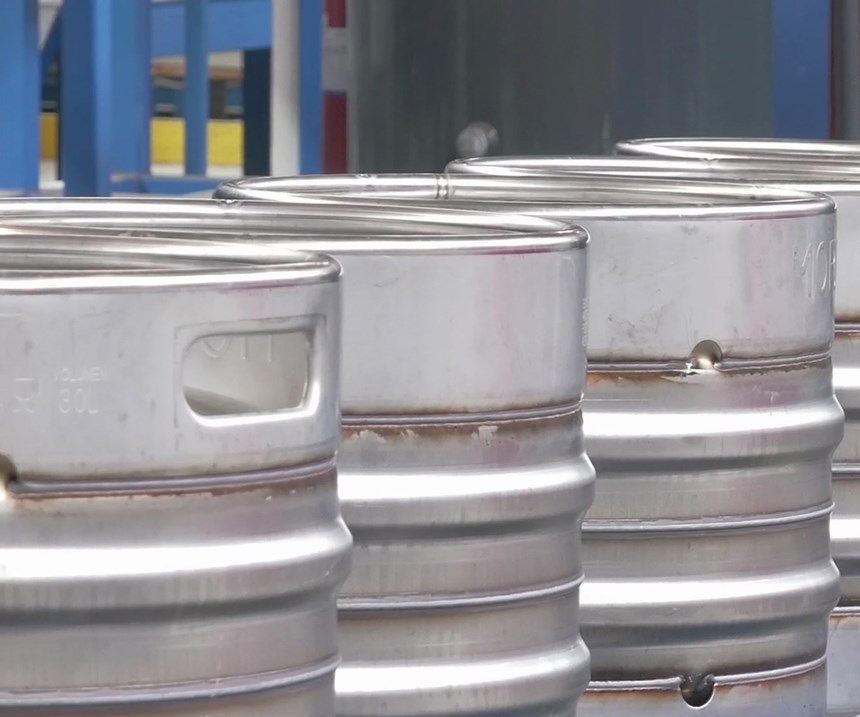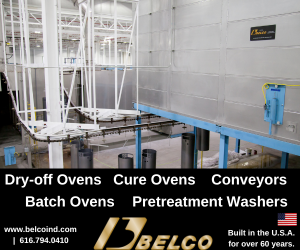Beer Barrel Maker Improves Product Quality with Nitric Acid-Free Pickling Process
Absence of citric compounds also addresses the growing concern among beer brewers about residual flavors in the barrels.
Henkel has helped Envases Técnicos Zaragoza S.L. Entinox, a Spanish manufacturer of stainless steel beer barrels, set up a pickling and passivating line using a nitric acid-free process.
The challenge in pickling solutions for stainless steel lies in removing all scale, iron contamination and welding oxides for achieving a fully passivated surface with an even, clean and aesthetic finish. In the food industry and for key products such as beer kegs, the surface must also be absolutely free of any traces of pickling agents after the process. In addition, manufacturers face increasingly strict health, safety and environmental regulations with regard to the release of potentially harmful substances, such as NOx emissions in air and nitrate effluents in water.
José Enrique Gerona, general manager of Entinox, says the company decided to implement Henkel’s Bonderite C-CP 1300 pickling and passivating process at the Zaragoza keg plant because of its combination of productivity and sustainability.
In contrast to common mixed-acid pickling systems, which are still used in many stainless steel segments, Bonderite C-CP 1300 contains no HNO3 (nitric acid), while delivering pickling and passivating results. Furthermore, its absence of citric compounds also addresses the growing concern among beer brewers about residual flavors in the barrels.
“Our process was developed with a clear target to eliminate the risks associated with HNO3 in traditional mixed-acid pickling systems,” says Ronald Elemans, business development manager for cleaners at Henkel. “Nitrogen oxide emissions from these systems can entail significant neutralization costs, and there is practically no feasible way of removing nitrate effluents in wastewater. Both factors also limit the possibility of increasing the productivity of the pickling process without heavy investments for NOx and NO3 ion removal.”
Bonderite C-CP 1300 can be used in spraying or immersion lines and is suitable for almost any stainless steel grades based on austenite, ferrite, martensite or duplex, including high-chromium AISI/SAE 4XX qualities. The system includes a starter for bath makeup; two components (R and Z) to maintain the acidity of the bath as well as the oxidizing and passivating capacity of the pickling solution; and an optional accelerator for use in tough-to-pickle materials or in applications with limited contact times.
Entinox’s kegs are normally made from 1.4307 (AISI 304L)-grade stainless steel sheet, which is one of the most widely used austenitic chromium-nickel steel alloys. After bending, forming and welding, each keg has a surface of 2 square meters. Prior to pickling, the barrels are cleaned and degreased using a Bonderite C-AK product in a spray washer. The Bonderite C-CP 1300 R and Z mix is then applied in another spraying step. The manufacturer’s new Zaragoza plant has a production capacity of up to 450,000 barrels per year and offers kegs in standard sizes of 20 to 50 liters as well as 7.75 and 15.5 U.S. gallons, including various customized options.
“The pickling quality and efficiency that we achieve with Henkel’s process is outstanding,” says Angel Roche, technical manager for Entinox. “While the resulting corrosion resistance is on par with that provided by mixed nitric acid-based systems, Bonderite C-CP 1300 provides a significantly longer bath life. Moreover, as a more environmentally friendly nitric acid-free solution, it also eliminates the risk of nitric fumes within the production area. And the absence of hexavalent chromium means that all effluents can be treated in our existing wastewater plant.”
Related Content
Products Finishing Reveals 2024 Qualifying Top Shops
PF reveals the qualifying shops in its annual Top Shops Benchmarking Survey — a program designed to offer shops insights into their overall performance in the industry.
Read More3 Tests to Ensure Parts are Clean Prior to Plating
Making sure that all of the pre-processing fluids are removed prior to plating is not as simple as it seems. Rich Held of Haviland Products outlines three tests that can help verify that your parts are clean.
Read MoreNanotechnology Start-up Develops Gold Plating Replacement
Ag-Nano System LLC introduces a new method of electroplating based on golden silver nanoparticles aimed at replacing gold plating used in electrical circuits.
Read MoreInnovation in Plating on Plastic
Plating on advanced plastics solution offers improved adhesion, temperature resistance and cost savings.
Read MoreRead Next
A ‘Clean’ Agenda Offers Unique Presentations in Chicago
The 2024 Parts Cleaning Conference, co-located with the International Manufacturing Technology Show, includes presentations by several speakers who are new to the conference and topics that have not been covered in past editions of this event.
Read MoreEducation Bringing Cleaning to Machining
Debuting new speakers and cleaning technology content during this half-day workshop co-located with IMTS 2024.
Read MoreEpisode 45: An Interview with Chandler Mancuso, MacDermid Envio Solutions
Chandler Mancuso, technical director with MacDermid Envio discusses updating your wastewater treatment system and implementing materials recycling solutions to increase efficiencies, control costs and reduce environmental impact.
Read More























